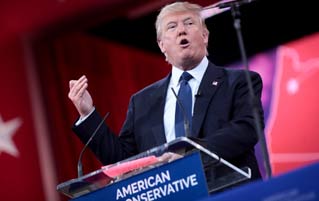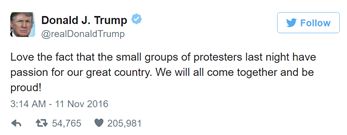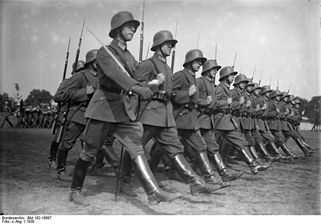4 Signs President Trump Is Headed For A Hitler-Like Reign

Well, it happened. Donald Trump is the president-elect of the United States. And a lot of people have been somewhat soothed by the fact that his acceptance speech sounded like it came from some bizarro world non-terrible version of himself. He "seriously" noted that the American people owed Hillary Clinton a "debt of gratitude," and went on to say:
"Now it is time for America to bind the wounds of division, have to get together. To all Republicans and Democrats and independents across this nation, I say it is time for us to come together as one united people."
And according to the immediate media reaction, this comforted a lot of people:



Trump's words there could've come from the mouth of any prior president -- they were the sane, reasonable sentences of a statesman who truly cares about the future of his country. It doesn't sound like the sort of thing Hitler would say. Except here's what Hitler said when he took power:
Last October, when the rest of us couldn't conceive of Trump the Nominee, let alone Trump the President, my colleague and former Cracked writer Adam Brown predicted he'd win, and predicted that his presidency would be, in a word, Hitlerian:

I still don't think that's likely. But then again, I didn't think any of this could happen. So in the interest of being prepared, I dove into history books about the rise of the Third Reich to try to build a hypothetical road map to American Fascism. When Hitler rose to power, Germany was still one of the wealthiest, best-educated nations on earth, and the success of his campaign came from directly targeting the millions of out-of-work Germans who had been devastated by the stock market crash in America (the Great Depression affected the entire world, you see) by promising them jobs and a better economy. Sound familiar? If it happens here like it happened there, here's how it'll start ...
The Open Racism Stops Suddenly
Most depictions of Hitler's rise to power are just montages of cheering crowds, shouted speeches, and goose-stepping brownshirts. You imagine all that "death to the Jews" stuff just followed him around like a particularly moist fart. But in actuality, for the first six years he was in power, Adolf Hitler only brought up anti-Jewish measures three times in public. When antisemitic violence broke out in the wake of his rise to power, he denounced it:
"Harassment of individuals, the obstruction of cars, and disruptions to business are to be put to an absolute stop ..."
You see, in 1933, Hitler's position in Germany was pretty fragile. He'd just barely managed to sneak his way into power after a very tight election, which The New York Times described in terms that could almost fit this election (if Trump had actually won with a majority of the vote):
"It is hard to overlook the fact that a campaign marked by flagrant repression ... by unremitting efforts to frighten the neutral voting masses into support of the Nazi regime, resulted in a bare 51% majority ..."
The man couldn't afford to go full Nazi right from the get-go. Hitler's regime did push for a boycott of all Jewish-owned businesses, but it was wildly unpopular and he immediately distanced himself from it. He focused his efforts on appearing presidential (or chancellor-like, whatever). His act was convincing enough that it fooled publications like BusinessWeek into relieved optimism:
"The best authorities in Berlin expect a steady decline in jingoist action against the Jews."
And one expert in German politics in the U.S. Embassy noted, "There is much reason to believe that ... does not approve of the indiscriminate and general action which has been taken against Jews."
Some of this little article is inspired by the wonderful The Nazi Conscience, by historian and Duke professor Claudia Koonz. It's a book you should all read, because it includes what amounts to a blueprint for how Nazism went from the angry speeches of a fringe political candidate to the Third Reich. Here's how it describes Hitler's first steps after winning power:

And while he kept quiet and stayed polite, Germany enacted scores of new laws restricting the rights and freedoms of Jewish people. Minorities and leftists were attacked in the streets. Germany crept closer and closer to outright madness. But if you were a normal, conservative German who liked Hiter's economic policy but didn't care for the racism, the first few years of Hitler's reign might've seemed like a hopeful time.
He'll Rein In His Most Violent Supporters
Hitler won his last election with roughly 33 percent of the vote; that's 12 million or so Germans. At its height in 1940, the Nazi party never had more than about half that number of registered members. Hitler's mandate came from non-Nazis. Some of those voters were even Jews, who liked his economic policies and thought he was just kidding about the racism.

"That's not the goofy smile of a genocidal dictator."
The first wave of new Nazi policies were filled with exceptions designed to placate Hitler's moderate supporters and avoid drawing international ire. Two-thirds of all Jewish lawyers in Germany were allowed to keep their jobs, because they were veterans. Most Jewish children were allowed to stay in school. But Hitler's supporters were so riled up by the rhetoric of his campaign that one of the first problems the new Nazi state had to confront was actually curbing the most violent of them. Here's how The Nazi Conscience describes it:

If you've been paying attention to the news, that might sound unnervingly familiar. Hate crimes against Muslims are the highest they've been since 9/11. In Los Angeles alone, hate crimes against Hispanics have jumped 69 percent in the last year. (This is the first time I've typed "69" and not giggled a little.) This election's aftermath has seen a surge of reported hate crimes. And yes, some of those are fake. But the data still suggests we're on the crest of a new wave.
This is part of a broader trend than just Trump. Post-Brexit, hate crimes in the UK leapt by 60 percent. Hate crimes against Latinos have been on the rise for years now, before Trump ever announced his candidacy. You can make the case that he's incited some of that, and that his presidency's going to make shit like this a lot more common.

But that's not necessarily a sign that Trump himself is going full Nazi. A more worrying sign is what's happening with Trump's proposed ban on Muslim immigration. He backed off on that promise earlier this year, then reinstated it, phrased as a ban on immigration from "terrorist nations." But if you go to his campaign's website, you'll find his original statement still intact:

So far, whenever there's been mass outcry against an obviously racist proposal, Trump has backpedaled. This could be a good sign. But it could also be a Hitler-y sign, if all the outrage makes him do is change his phrasing. When protests broke out in the immediate aftermath of Trump's election, he tweeted this:

When people started freaking out, he changed his tune to something way more presidential a few hours later:

And if that marks an honest change in his heart as the responsibility of his new office sinks in? Fucking great. But if you're really worried about President Trump becoming Fuhrer Trump, ignore his words. Watch the legislation he champions and advocates. If he starts attacking journalists by "opening" libel laws, which he's promised to do, that'll be a sign. If his pick for attorney general (probably Rudy Giuliani) supports violent police responses to protesters and minorities, that'll be another sign.

Yep, it's looking like a safe four years for black people!
The post-election surge in violence doesn't mean we're on the bullet train to Fascism Town. But the fact that Donald is talking like a sane person right now doesn't mean we're safe, either. If he is the Hitler-y kind of monster, and not just the Nixon-y sort, right now is when he'll be on his best behavior. Until ...
He Remakes The Military
When Hitler took power in 1933, the only force in Germany with the power to resist him was the German military. Most of the old Prussian generals in charge weren't big fans of him. And even though his private army, the SA, outnumbered the German Reichswehr three million to 100,000, those were mostly untrained street brawlers, not soldiers. They wouldn't have held up to a trained army with machine guns.

And swords, apparently.
As late as the German invasion of Normandy, Allied leaders expected officers of the German military to stop Hitler. But by that point, Hitler had replaced enough of the old German officers to ensure the army's compliance. Obviously, Trump isn't commander in chief yet, and the American military now isn't in a place even a little similar to the German Army in 1933. But there are still a couple of red flags. For instance, remember when this happened?

A lot of people, including former CIA director Michael Hayden, said the military would likely refuse those orders. Trump's response to that should get your Hitler-sense tingling a bit: "They're not going to refuse me. If I say do it, they're going to do it." And then, during a September interview with Matt Lauer, Trump said that when it'll be time for President Trump to ask America's generals for their advice on ISIS, "they'd probably be different generals" than the ones serving President Obama. The commander in chief can relieve generals of command, but it's generally only done in extreme circumstances, like when Douglas MacArthur tried to nuke the shit out of China.

Maybe he saw this movie coming, and was just trying to protect the craft of cinema?
If Trump starts firing a lot of generals and admirals for reasons more frivolous than "trying to start World War Three," that'd be another space on our Hitler Bingo card. Please note that even if he does do this, it won't necessarily have an apocalyptic end. When I interviewed Marine Corps Colonel David Couvillon for my article about a hypothetical Civil War II, he reminded me of the Business Plot.
In brief, that's the time a bunch of fascist American bankers tried to depose President Roosevelt and turn the U.S. into Nazi Germany with worse beer. They reached out to Marine Corps Major General Smedley Butler to help lead their coup. He wound up denouncing them to Congress and saving democracy. Luckily for us all, memes hadn't been invented yet and the plotters didn't know Smedley was this kind of guy:

So even if Trump does have fascist-y ambitions, there's no guarantee the military would let him indulge them. But even if Smedley Butler 2: This Time It's Smedlier is somewhere in the top brass, he (or she) might not be able to protect us if ...
He Builds An Infrastructure For Oppression
One of Hitler's first moves as chancellor was to take control of the German police and intelligence services. Trump has the right as president to appoint leaders for law enforcement organizations like the DEA and FBI. That's not a sign of anything; that's just his job. But Hitler went further than just picking guys he liked. He used the German police and intelligence services to attack his political rivals, and eventually crush all organized dissent.
Now, obviously it's almost impossible to imagine a law enforcement agency acting directly to attack a certain political party ...

Oh. Right.
But that's not as worrying as the fact that Newt Gingrich, who might be Trump's secretary of state, just said this:

The original House Un-American Activities Committee was started in 1938 to help the government ferret out Communists (Gingrich claims it was created to fight Nazis, but he's wrong). HUAC -- an acronym noteworthy because it sounds like onomatopoeia for vomiting -- quickly degenerated into assholes subpoenaing celebrities to ask if they were commies. Some of these famous people refused to say whether or not they'd ever been members of the Communist Party, so they were fined, thrown in prison for a year, and basically prohibited from working.
Gingrich wants HUAC back so we can ferret out ISIS sympathizers. But if the new HUAC happens, there's no good reason to expect it wouldn't become a tool of intimidation. It'd actually be breaking with history for it to not wind up terrible.

It'll be this, with most of those cameras replaced by iPhones.
A new House Un-American Activities committee would give Trump an easy way to harass, and prosecute, the people who resist him. If he is planning to go Full Nazi at some point, you can bet we'll see something like HUAC spring up along the way. The good news is that the president can't create congressional committees -- the House and Senate do that. The bad news is that the Republican Party controls both, and so far, their record of "denying Trump the things he wants" isn't very good.
It's hard to imagine Congress and the bulk of American law enforcement agencies agreeing to become Trump's Gestapo. But this was all hard to imagine a year ago, and it's pretty clear that Trump's gut instinct is to jail his most serious opponents.

This isn't a call to revolt. David Wong is right when he says this is not the time to panic. But it is the time to keep a careful eye on President Trump. Really, that should be everyone's job with every president. But since shit like this keeps happening ...

... it's probably extra important to keep our guard up.
Robert Evans writes about a more lighthearted subject (the insane ways our ancestors got high) in his new book A Brief History of Vice.
For more check out How Actual Nazis Are Influencing Trump (More Than He Knows) and The Problem With Calling Donald Trump A Nazi.
Subscribe to our YouTube channel and check out Donald Trump Finally Embraces The Hitler Comparisons - Cracked Responds and watch other videos you won't see on the site!
Also follow us on Facebook, because we're all in this together.